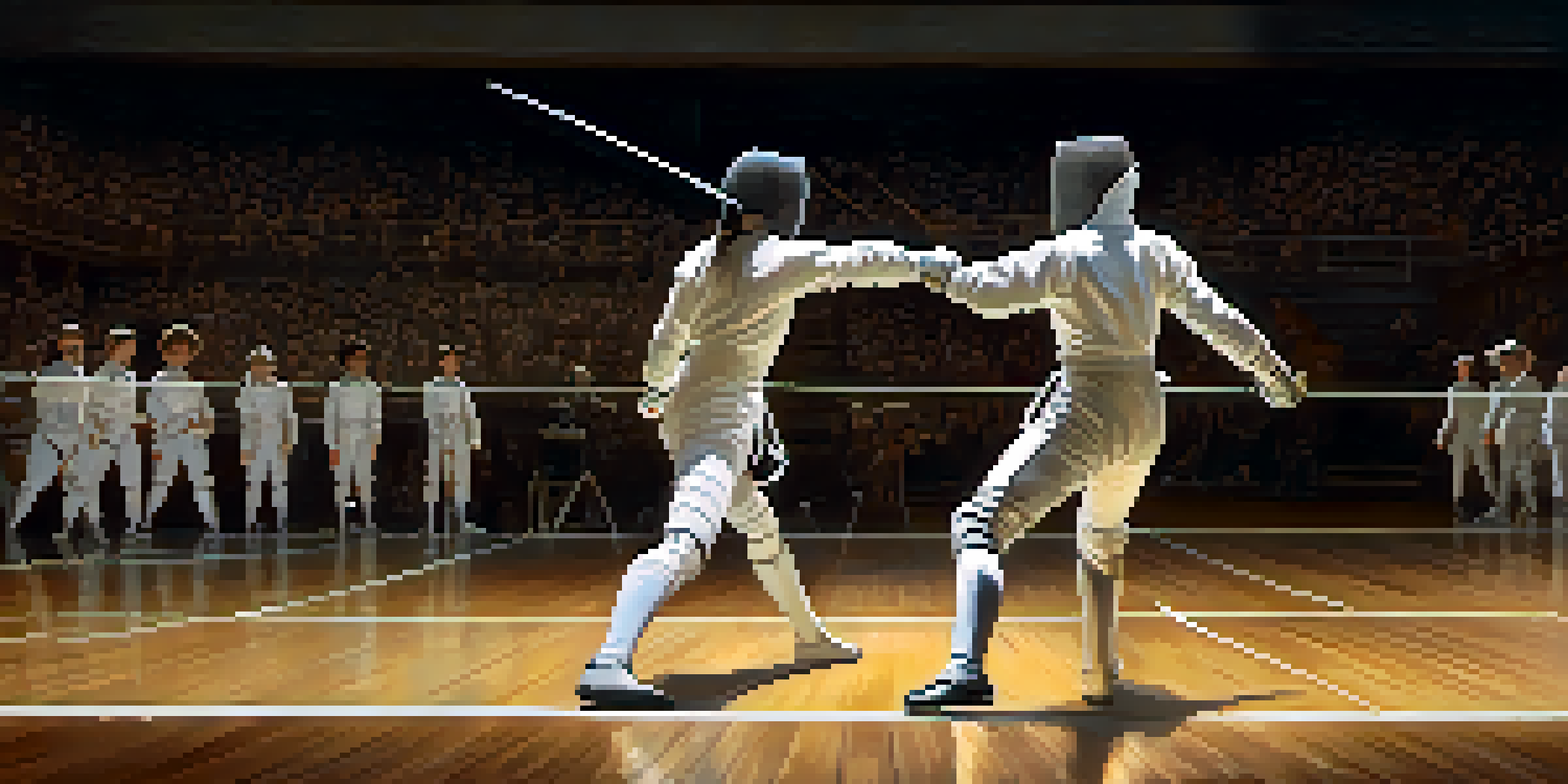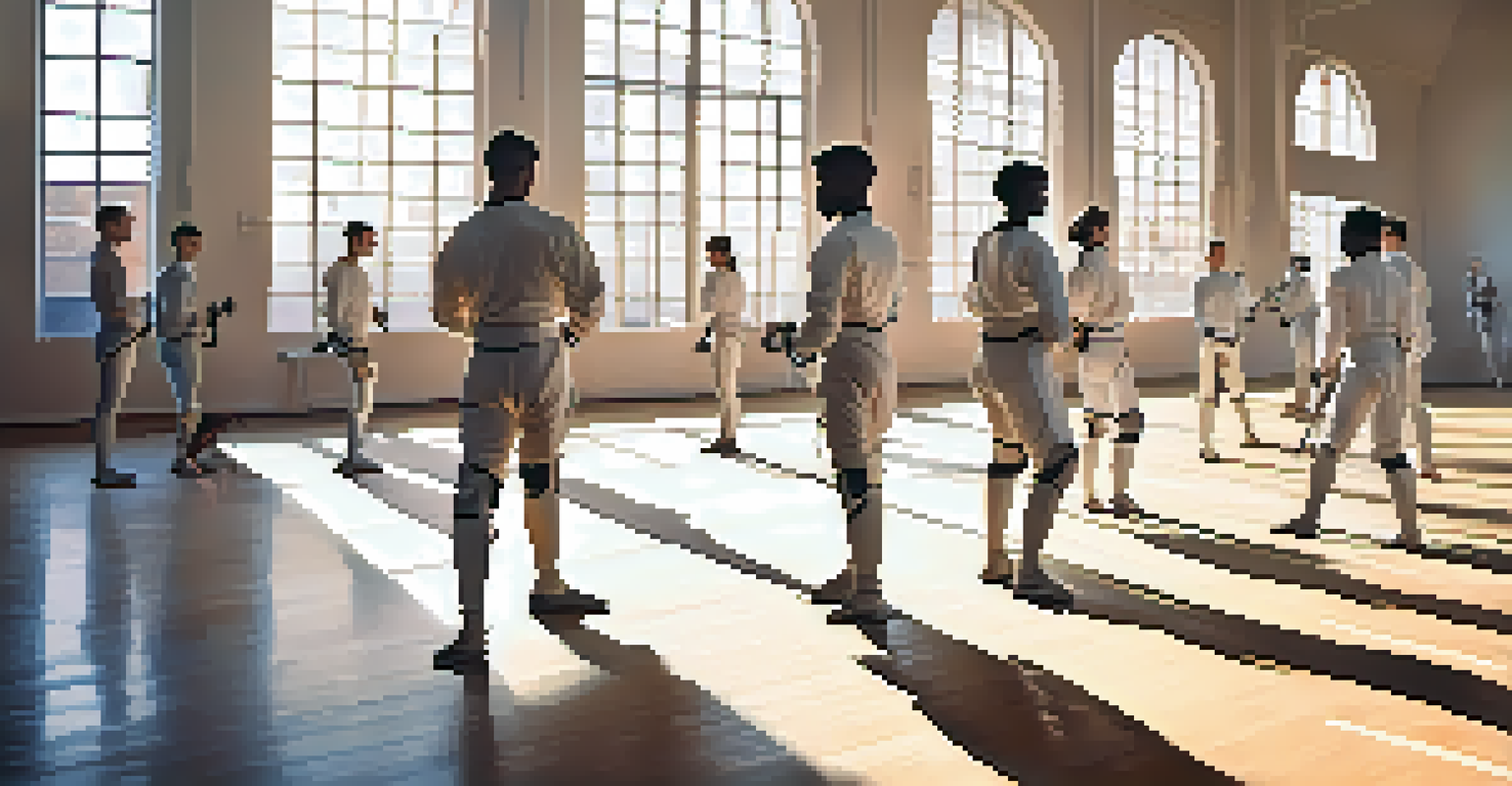Fencing as a Lifelong Sport: Benefits Beyond Competition

Fencing: An Introduction to a Unique Sport
Fencing is more than just a sport; it's a blend of art and athleticism. With its roots tracing back to ancient swordsmanship, it has evolved into a dynamic and strategic activity. Whether you're a beginner or an experienced fencer, the beauty of fencing lies in its ability to engage both the body and the mind.
Fencing is a physical chess game; it demands strategy, speed, and adaptability.
Unlike many sports, fencing is accessible to people of all ages and skill levels. It encourages participants to develop agility, coordination, and quick decision-making skills. This inclusivity makes it a perfect choice for anyone looking to stay active, regardless of their starting point.
As you step onto the strip, you’ll find that fencing is not only about competing against others but also about facing your own challenges. This creates an environment where personal growth and self-discovery can thrive, making it an appealing lifelong pursuit.
Physical Benefits of Fencing at Any Age
One of the most significant benefits of fencing is its ability to enhance physical fitness. The sport demands quick reflexes and explosive movements, promoting cardiovascular health, strength, and flexibility. As you advance in your skills, you may find that these physical improvements extend into your daily life.

Moreover, fencing offers a low-impact workout that reduces the risk of injury while still providing a full-body exercise. This makes it particularly appealing for older adults who want to stay active but may be concerned about high-impact sports. Fencing encourages a lifestyle of movement that can be sustained well into one's later years.
Fencing Enhances Physical Fitness
Fencing promotes cardiovascular health, strength, and flexibility, making it an excellent full-body workout for all ages.
In addition to physical conditioning, fencing fosters a sense of discipline and focus. The practice of regularly attending sessions, learning techniques, and honing your craft contributes to a healthier lifestyle overall, making fencing an excellent choice for long-term fitness.
Mental Sharpness: A Key Benefit of Fencing
Fencing is often described as physical chess; it requires strategy, quick thinking, and adaptability. Each bout is a mental duel where you must analyze your opponent's moves while anticipating their next action. This mental engagement stimulates cognitive function and improves problem-solving skills.
The beauty of fencing lies in its ability to engage both the body and the mind.
The sport also teaches valuable lessons in concentration and mindfulness. As you focus on your opponent and the rhythm of the bout, distractions fade away, creating a meditative experience. This not only enhances your performance in fencing but can also improve your focus in other aspects of life.
Furthermore, the mental challenges posed by fencing can help build resilience. Fencers learn to manage pressure, cope with losses, and celebrate victories, all of which contribute to a stronger mental fortitude over time.
Building Community Through Fencing
One of the often-overlooked benefits of fencing is the sense of community it fosters. Whether you join a local club or participate in tournaments, you'll meet diverse individuals who share your passion for the sport. These connections can lead to lasting friendships and a supportive network.
Fencing clubs often host social events, workshops, and training camps, providing opportunities to bond with fellow fencers. This camaraderie creates a welcoming environment that encourages individuals to push their limits while also having fun. It's a unique blend of competition and collaboration.
Builds Community and Connections
Joining a fencing club fosters friendships and a supportive network, enhancing the overall experience of the sport.
Moreover, being part of a fencing community can also enhance your commitment to the sport. When you train with others, you hold each other accountable, celebrate achievements together, and navigate challenges as a team, making the journey more enjoyable and fulfilling.
Lifelong Learning: Mastering Fencing Skills
Fencing is a sport that emphasizes continuous learning and improvement. No matter how experienced you become, there’s always a new technique to master or a strategy to refine. This aspect of the sport keeps it fresh and exciting, inviting fencers to embrace a mindset of lifelong learning.
As you progress in fencing, you may find yourself drawn to different styles or techniques, each offering new challenges. This adaptability encourages personal growth and keeps your training engaging. The evolution of your skills can lead to a sense of achievement that motivates you to stick with it for the long haul.
Moreover, the learning doesn’t stop at technique; fencers also study the history and theory behind the sport. This deepening knowledge can enhance appreciation for the art of fencing and its cultural significance, enriching your overall experience.
Fencing as a Stress Relief Activity
In today's fast-paced world, finding effective ways to manage stress is crucial. Fencing serves as an excellent outlet for releasing pent-up energy and emotions. The physical exertion involved in fencing is a natural stress reliever, allowing you to channel your frustrations into productive movements.
Additionally, the focus required during bouts and training sessions creates a break from daily worries. This immersion in the sport can provide a mental reset, helping you return to your routine with a clearer mind. Fencing offers a unique way to escape while still engaging physically and mentally.
Fosters Lifelong Learning
Fencing encourages continuous skill improvement and personal growth, inviting participants to embrace a mindset of lifelong learning.
Many fencers find that regular practice not only improves their skills but also their overall mood. The combination of physical activity, social interaction, and mental engagement makes fencing a holistic approach to managing stress and promoting well-being.
Conclusion: Embrace Fencing for a Lifetime of Benefits
In conclusion, fencing is a sport that transcends competition, offering a multitude of benefits that can enrich your life in various ways. From physical fitness and mental sharpness to community building and stress relief, the advantages of fencing are both profound and varied. It’s a sport that invites you to grow and adapt throughout your lifetime.
Whether you're looking to stay fit, improve your mental agility, or make new friends, fencing provides a platform for achieving all these goals. The journey of a fencer is filled with challenges, learning, and endless opportunities for personal growth.

So, if you’re considering a new activity or seeking a lifelong sport, why not give fencing a try? Embrace the art of fencing and discover the lasting benefits it can bring to your life, both on and off the strip.